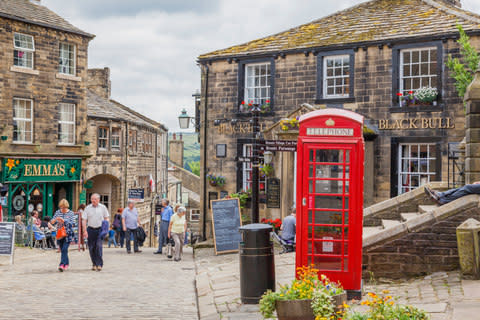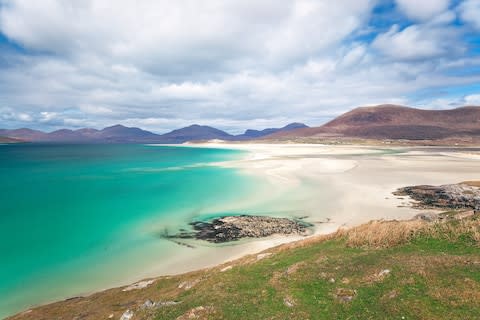An ode to the tourist information centre, a British institution trundling towards extinction

First they came for our public toilets. And we did nothing. Then they came for our free seaside car parks. And we stood back and watched. Now they're coming for our tourist information centres. Will this prove to be the red line that shall not be crossed?
Last week Visit Scotland, the nation's state-owned tourist agency, announced that it will close 39 of its 65 centres, including some in remote regions and far-flung islands. This was the largest single ensemble of tourist centres to be rounded up and shoved into the tumbril.
Across the UK, the shutters have been put up for the last time at Tourist Information Centres (TICs), with many more facing an uncertain future. A quintessentially British institution is trundling to extinction.
The sickness has even extended to our national parks, with the New Forest now the first in Britain to exist without a visitor centre after the local council closed their building in Lyndhurst. A petition opposing the closure received more than 900 signatures to no avail. Visit the website of the park authority today and - written with no sense of shame or irony - is the following: “There are a number of excellent information points for visitors within the New Forest National Park. Local Information Points in local business premises such as shops and post offices are a good place for face-to-face information.”
The entire compendium of the former visitor centre has been condensed into a handful of leaflets on a spinner in the local museum.

A similar story is emerging at Haworth, the Pennine village where the three Bronte sisters grew up and where the survival of the visitor centre depends on an agreement being reached between the council and the Bronte Parsonage Museum.
Those who sit in judgement cite two justifications as they don the black cap and pronounce the grim news: austerity and/or the sunlit uplands of web-based tourism that appears destined to take its rightful place at the centre of everything. Usually, the latter is a handy means of covering up the former.
Despite the zillions of people who walk in every year they still treated me as though mine was the first face they had seen for a week
Let's be clear: there is much that is wonderful about e-tourism: we can download a walk, check last-minute hotel availability or see if a seal-watching boat operator is putting on an extra trip. And a website holds much more information than a weather-beaten indecipherable panel in a car park.
That is fine, just so long as you can get hold of the internet outside metropolitan areas. In many parts of the UK, from swathes of Cornwall to mid-Wales and the Scottish Highlands and Islands, that is impossible. On the Outer Hebrides I see a dozen people a day with one arm upright, trying in vain to get a mobile signal.
In any event, even if you can access everything online, do you really want to?
I don't believe you have to be a Luddite to enjoy popping into a remote tourist office and chatting to someone who really knows their stuff. Travel is often as much about meeting people as it is the sights and activities. In my experience, the majority of staff and volunteers in TICs are invariably passionate about their locality and generous with their knowledge.
13 beautiful places in Britain you'd never thought to visit
Haworth is a case in point. For all the Wuthering Heights tat knocking around, you can tell the staff have actually read the novels and want to share their enthusiasm, even though they've been asked the same question 10,000 times.
On the west coast of Harris I once spent an hour trying to find the path to the beach at Scarista. Thwarted by the walls and barbed wire of a croft, I gave up. It was the woman at the Tarbert tourist centre who not only told me how to find it but drove me there.
Ambleside in the Lake District is a shining light too. Despite the zillions of people who walk in every year they still treated me as though mine was the first face they had seen for a week and gave some genuinely helpful tips on where to take the kids during the monsoon that was passing overhead.
My favourite of all is another centre with the axe hovering over it, the magnificent VIC in Durness, a remote village tucked up in the top left-hand corner of Sutherland. The building boasts perhaps the best view of any visitor centre, overlooking the glorious Sango Bay, while the centre hosts superb displays of local wildlife and geology, presented in accessible form by real experts in their field. Essentially, this tells you all about the landscape you've just driven through, one of the most primordial parcels of the UK. Above all what stays with me is the friendly face that greeted us as we walked through the door after a long journey through the wilds of Wester Ross and Assynt. “Come far?” she smiled. Everyone who makes it to Durness has come far, and ingenuity will be needed on an epic scale over the next few years if the centre is to survive.
In many places, local communities will step in and fill the void. Visit Scotland clearly expects this to be the case, because it is in the interests of local people to promote their tourism wares. Visit Scotland says its information centres will be replaced with 1,500 “information partners” , comprising local businesses, such as bed and breakfasts, distilleries or local retailers. Meanwhile, Visit Britain, its UK-wide parent, has been negotiating with bookshop Waterstones to host information leaflets in its stores.

Of course, not all TICs are great. Some are truly awful and deserve what's coming to them (though none is quite so bad as the tourist office in Minsk in Belarus I once visited, where the following conversation took place: “Can you recommend any hotels?” “No.” “Do you have train timetables?” “No.” “Do you know where the train station is?” “I don't care.”).
Many are past their sell-by date, as is their 1980s business model predicated on commission from booking accommodation for travellers in an age before Airbnb and the rest.

One obvious solution would be to make them more dynamic. Rather than selling people a laminated Loch Ness Monster or a music box with a pirouetting Squirrel Nutkin, why not offer tea and cake or a retro 1950s milk bar? Or hand the premises over after sundown to local community clubs? Or invite musicians to entertain visitors with local tunes? That, though, would involve human beings interacting with one another. And in the Age of the Internet it's not altogether clear if that’s what the tourist boards want.

